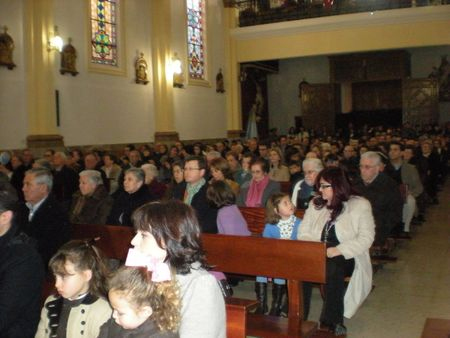
8. You shall dive into your own spiritual tradition

More than in ideas or concepts as such, I am interested in how such a spirituality can motivate us to a more passionate concern for the protection of our world.
(LS, 216)
We live in a materialistic world and, nevertheless, the search in Internet of the word "spirituality" reports infinite pages full of definitions, experiences, studies, advices to live it... This point of the Decalogue is not intended as an analysis, but rather to draw a connection between the importance of knowing and living in a coherent way our own spiritual tradition and the care of the most fragile people, as well as the planet itself, which affects a dramatic vulnerability.

Etymologically, the term spirituality derives from Latin and alludes to a quality relative to the soul. We are complete persons and we cannot separate body from soul. Rather, we must be able to discover that, inside each being, there is a precious space of relation with what is important in life. All spiritual traditions reference the human need to go to the encounter of peace, to reach the balance and to obtain the harmony, seemingly lost between the haste, the violence or the injustice that surrounds us. From the dawn of time, people have needed to transcend the realm of the purely material and find ways of expressing those longings and experiences. What is within us is necessarily reflected in our scale of values, behaviours and way of life. That is why it is essential that this inner experience be oriented towards a state in which personal well-being and service to others unite. A state where we can feel the certainty of God's infinite love and the need to share that love with everything around us.
In the Christian spiritual tradition, as could not be otherwise, our example is Jesus of Nazareth, the Righteous One. His life, his death, his presence show us, in a clear and precise way, the keys to a life of disciples. Jesus lives with passion, with closeness, with service, with joy. He dies humbly, with peace, with surrender. Between his life and his death there is no rupture, one is a consequence of the other and everything responds to God's plan for Humanity: to recover Life, hope, fullness. As Pope Francis says in the Apostolic Exhortation Evangelii gaudium: "the personal love of God who became man, who gave himself up for us, who is living and who offers us his salvation and his friendship." And in the words of Benedict XVI: "Being Christian is not the result of an ethical choice or a lofty idea, but the encounter with an event, a person, which gives life a new horizon and a decisive direction." (Encyclical Deus caritas est).
Recognizing what is good, what is just, what is beautiful can impel us, give us meaning and encourage our own life and our relationship with others and with the "Common House". As the Pope goes on to say, "its mandate of charity encompasses all dimensions of existence, all individuals, all areas of community life, and all peoples."
Our campaign wants to spread this inevitable implication in the care of others and of our planet from our own spiritual tradition with coherence, authenticity and joy.
Voices that claim...

Marco Martinez
Peasant, Colombian Amazon
"They want to displace us, to take away the land to sow the oil palm. The government and its authorities favour business, they have irregularly initiated an adjudication process, they want to take us out of the land, we have always lived there. That is where the school was going to be held. Our vocation is agricultural, our roots, our identity is in these farms, in this way our rights are violated, without any opportunity to defend ourselves.
"They want to displace us, to take away the land to
sow the oil palm. The government and its authorities favour business, they have
irregularly initiated an adjudication process, they want to take us out of the
land, we have always lived there. That
is where the school was going to be held.
Our vocation is agricultural, our roots, our identity is in these farms,
in this way our rights are violated, without any opportunity to defend
ourselves.
I am in this fight, because I believe that this is my only legacy, to resist and help my community.
With what little knowledge you have, here, if we do not act, no one will act for us."

Pope Francis
Pope of the Catholic Church
On September 1, the World Day of Prayer for the Care of Creation was celebrated. Pope Francis and Ecumenical Patriarch Bartholomew published a joint message. The Holy Father addresses the main problems concerning the relationship of human beings with their fellow human beings and with nature. He tells us that in order to face the degradation of the environment, the depletion of natural reserves and the pernicious effects of environmental pollution, a decisive and urgent response from believers and non-believers is unavoidable.
Scripture reveals that, "in the beginning," God wanted humanity to cooperate in preserving and protecting the environment. The earth was entrusted to us as a sublime gift and legacy, for which we are responsible until, "at the end", "to bring unity to all things in heaven and on earth under Christ" (cf. Eph 1:10). Our human dignity and well-being are deeply connected with our care for all of creation.
Scripture
reveals that, "in the beginning", God intended humanity to cooperate in the
preservation and protection of the natural environment.
[...]
MESSAGE ON THE WORLD DAY OF PRAYER FOR THE CARE OF CREATION 2017
[...]
At first, as we read in Genesis, "no plant of the field was yet in the earth and no herb of the field had yet sprung up - for the Lord God had not caused it to rain upon the earth, and there was no one to till the ground" (2:5). The earth was entrusted to us as a sublime gift and
legacy, for which all of us share responsibility until, "in the end", all things in heaven and on earth will be restored in
Christ (cf. Eph 1:10). Our human dignity and welfare are deeply connected to
our care for the whole of creation.
However, "in the meantime", the history of the world presents a very different context. It reveals a morally decaying scenario where our attitude and behaviour towards creation obscures our calling as God's co-operators. Our propensity to interrupt the world's delicate and balanced ecosystems, our insatiable desire to manipulate and control the planet's limited resources, and our greed for limitless profit in markets - all these have alienated us from the original purpose of creation. We no longer respect nature as a shared gift; instead, we regard it as a private possession. We no longer associate with nature in order to sustain it; instead, we lord over it to support our own constructs.
The consequences of this alternative worldview are tragic and lasting. The human environment and the natural environment are deteriorating together, and this deterioration of the planet weighs upon the most vulnerable of its people. The impact of climate change affects, first and foremost, those who live in poverty in every corner of the globe. Our obligation to use the earth's goods responsibly implies the recognition of and respect for all people and all living creatures. The urgent call and challenge to care for creation are an invitation for all of humanity to work towards sustainable and integral development.
Therefore, united by the same concern for God's creation and acknowledging the earth as a shared good, we fervently invite all people of goodwill to dedicate a time of prayer for the environment on 1 September. On this occasion, we wish to offer thanks to the loving Creator for the noble gift of creation and to pledge commitment to its care and preservation for the sake of future generations. After all, we know that we labour in vain if the Lord is not by our side (cf. Ps 126-127), if prayer is not at the centre of our reflection and celebration. Indeed, an objective of our prayer is to change the way we perceive the world in order to change the way we relate to the world. The goal of our promise is to be courageous in embracing greater simplicity and solidarity in our lives.
For all these reasons, and as voices that claim, they made an calling, to those in positions of social and economic, as well as political and cultural, responsibility to hear the cry of the earth and to attend to the needs of the marginalized, but above all to respond to the plea of millions and support the consensus of the world for the healing of our wounded creation.
The Pope tells us that there can be no sincere and
enduring resolution to the challenge of the ecological crisis and climate
change unless the response is concerted and collective, unless the
responsibility is shared and accountable, unless we give priority to solidarity
and service.


What can you do
(or stop doing)?

1.- Find time in your daily life for meditation and relaxation. It will help you to become aware of the present time, attending to thoughts, emotions and bodily sensations with an attitude of curiosity, interest and acceptance. Without judging. Enjoying the here and now.

4.- Learn to value the everyday. We constantly tend to yearn for that which we do not have or to deposit happiness in possessing new material things without esteeming, enjoying or paying attention to all those small details that happen in our lives and that are extraordinarily beautiful. In order to walk towards a greater spirituality and deepen our inner happiness, one of the first steps is to value what we have.

7.- Take a stand for the most vulnerable people on the planet. In your prayers, your daily behaviours, your decisions, with your consumption habits... Support justice, equality and care for nature.

8.- Deepen our Christian tradition. In it we have a long and rich journey in the experience of prayer. "But when you pray, go into your room, close the door and pray to your Father, who is unseen." (Mt. 6:6) The starting point is the Master, the Lord, Jesus Christ, who made of his life prayer, teaching and action in closeness to the needs of men. Look at yourself in him and pray as he did and with him, reading his Gospel every day, paying attention to what he says to you. Meditate on Jesus' relationship with the Father and on his attitude and behaviour with others, known and unknown, and with our Mother Earth, his Creation.

2.- Stand up, listen, feel and live the adventure of silence. In many occasions we do not live in a fluid way because of the noise, we experience and we need to stop to listen to the silence. Silence can make spirituality evident, without intermediaries. Silence is having the experience of the eternal in our life. In silence, you encounter your pure self, with your reality, with your spirit.

5.- Work on your empathy. Empathy is the ability to understand the thoughts and emotions of others, to put oneself in the place of others and to share their feelings. It is not necessary to go through the same experiences to better understand those around us, but it is necessary to listen, keep an open mind and without prejudice, show interest and understanding for the other person. Discover, recognize and reward the qualities and achievements of those around you. This will contribute not only to fostering their capacities, but they will also be aware of our concern and interest for them. Empathy brings us closer to others and ourselves, it is not possible to achieve true spirituality without empathy.

9.- At the end of the day, make a small review of what happened. In your time of silence and prayer, take a few minutes to think about the day that is ending. You can reflect with questions such as: How was the day? How were my activities? How was I, how was I, how do I feel? Consider all that you can improve and rejoice and thank God for all the good deeds you have done. Tomorrow you have another whole day, full of opportunities to improve what has not been good today and continue on the path of good deeds.

3.- Observe, enrich yourself and admire the environment. Reserve a few minutes to observe nature, from the largest, such as the sunrise or sunset, the clouds that evolve in the sky, changing shape and colour throughout the day, to the smallest, as a flower in its smallest details or the flight of insects. All of them contain details that, only by knowing, we learn to love and respect.

6.- Slow down your pace of life. Often times, we do not enjoy the things of the moment because we are attending to the next one; we do not give ourselves time. Speed, excess occupations and the obsession to save time are constant. To slow down is convenient and brings calm. The world is becoming aware that doing everything faster does not bring benefits, on the contrary. This will allow more time for listening, for looking at each other and connecting, for talking quietly without noise and without haste.

10.- Participate in the celebration of the Eucharist on Sundays with your community, from the silence sought and found in prayer and meditation, as a profound expression of your faith and spirituality in the tradition of the Church. "...For I received from the Lord what I also passed on to you: The Lord Jesus, on the night he was betrayed, took bread, 24 and when he had given thanks, he broke it and said, "This is my body, which is for you..."" (1 Cor. 11, 22 ff.).
Prayer
Breeze
Sometimes you're in the storm,
the overflowing passion,
the roar of battles
that I break,
with you
or against you,
and you're a downpour,
that cools my certainties
or put out my fires.
Sometimes you're in the hurricane
that scares and inflames me,
roaring with the roar of a prophet,
tearing the world apart
with the protest
of all the victims
who suffer, shout
and demand justice,
and you're the wind
that tears me away from home
until I dance with the world.
But sometimes you are,
everyday and discreet,
like a breeze in the morning,
in the weariness of days without reason,
in the routine of the clock inside,
in defeats without drama,
or victories without a party.
And you are silence
in my deserted prayer,
you're an inadvertent caress,
that, without me noticing,
relieves old wounds
as usual.
(José María R. Olaizola, sj)

